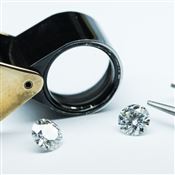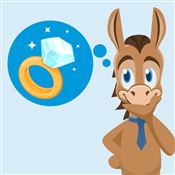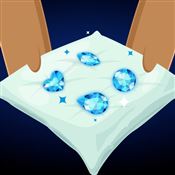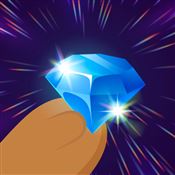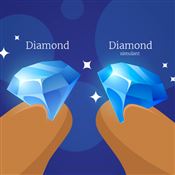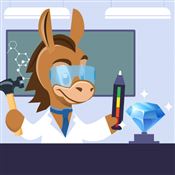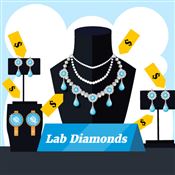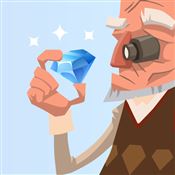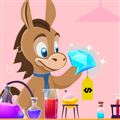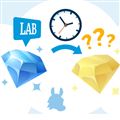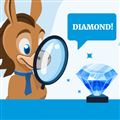Lab Created Diamonds
Lab created diamonds are misunderstood. They're not cheap "fake" diamonds. Here's the truth about this man-made rock.
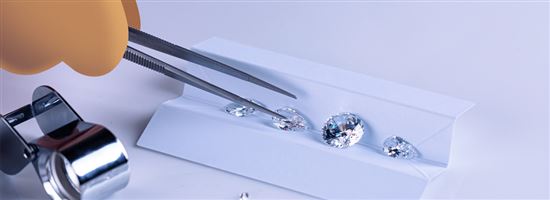 |
You want the perfect engagement ring, but you are on a budget. Lab-grown diamonds can save you money. But are they worth it?
It depends on who you ask.
In this guide, we'll help you learn about man-made diamonds. Are they good value? Should you propose with one?
Our goal is to help you fully understand your options. This way you can make the right decision for you and your loved one.
You will not be able to tell the difference between a lab created diamond and natural diamond. In fact, even many jewelers can't see it with their loupe.
Should you bite? Let's learn more.
What Are Lab-Grown Diamonds?
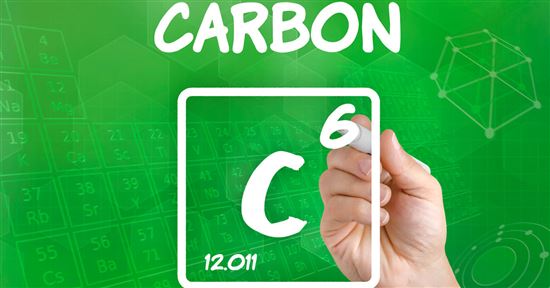 |
So what exactly is a man-made diamond? How could something that takes millions of years to cultivate be grown in a few weeks in a lab?
First, lab created diamonds are real diamonds. They have carbon structures the same as real diamonds. It's just that the process is sped up in a controlled lab environment.
They start with a carbon "seed." The seed is placed into a chamber where the heat, pressure, and gases make the diamond grow. The process takes between 6 and 10 weeks. Once full crystallization takes place, the diamonds are cut and polished. They then go through the same grading process as regular diamonds.
The final product is one that has the same characteristics as a natural diamond from the earth.
Synthetic diamonds will have natural flaws due to the formation of the rock. And just like a real diamond, it'll have different tints of color.
Fascinating, right?
According to Clark Watts, a spokesperson for lab-grown diamond retailer Lark & Berry, no one is able to tell the difference between lab-grown and mined diamonds with the naked eye.
"It's extremely difficult, if not impossible, for even seasoned gemologists to tell lab-grown diamonds from mined diamonds, simply because there is no difference between the two," Watts said. "Lab-grown diamonds even get mixed into batches of mined diamonds on occasion."
Lab Created Diamonds vs Natural Diamonds
The main difference between lab diamonds and natural diamonds is how they're made. And because of this, there is a big difference in pricing. Here's a comparison chart of natural vs lab diamonds.
| Natural Mined Diamonds | Lab Created Diamonds | |
|---|---|---|
| Creation | Formed over billions of years deep under the earth's crust | Mass produced in labs over just weeks |
| Properties | Made of carbon atoms | Made of carbon atoms |
| Quality | Comes in a range of sizes and color and clarity grades | Comes in a range of sizes and color and clarity grades. But lab technology can produce higher quality diamonds. |
| Pricing | More expensive; $5,000 - $6,000 for a good value 1-carat diamond | 50%-60% (or even more) less than price of natural diamonds |
| Hardness | 10 on the Mohs scale | 10 on the Mohs scale |
| Fancy Color | Naturally colored diamonds are rare and expensive | Lab technology can make colored diamonds for much cheaper |
| Certification | Graded based on 4Cs | Graded based on 4Cs |
Lab Created Diamonds vs CZ vs Moissanite
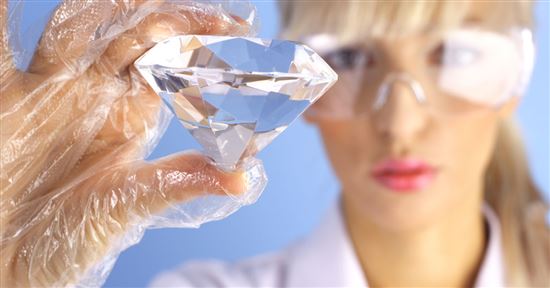 |
Cubic zirconia and moissanite are diamond simulants. These are things that look like a diamond, but do not have the same physical and chemical properties. They do not reflect light in the same way and are also not as durable as diamonds.
Lab diamonds are not diamond simulants. They are very much real diamonds. They are identical to naturally made diamonds from the Earth.
The most popular diamond simulants (or diamond alternatives) are:
- Cubic zirconia: CZs are made from a man-made material, so they are perfectly colorless and flawless. They shoot off a different type of sparkle. It's more of rainbow sparkle. CZs are also less durable than diamonds. They have no resale value at all.
- Moissanite: Moissanite is a gemstone first discovered in a meteor crater. Now, they are lab-grown. It's similar to a diamond in look, brilliance, and hardness. But it has more of a rainbow sparkle instead of a diamond's white sparkle.
- White sapphire: This is a natural gemstone. However, white sapphire does not have the brilliance of diamonds. They often appear a bit hazy.
Pricing: Lab Created Diamonds vs Real Diamonds
Let's face it, diamonds are expensive. The engagement ring's average cost is over $5,000.
If those numbers scare you, you may want to consider more affordable options.
Lab diamonds are now up to 75% cheaper than natural diamonds. The price for lab diamonds has never been better, making them a compelling value proposition now compared to years ago.
Let's take a look at the current pricing. We'll be using real examples from James Allen, as it offers both natural and lab diamonds at competitive prices.
We compared prices of lab and natural diamonds of the same size and quality.* Here's what we found:
| Natural Diamond | Lab Diamond | |
|---|---|---|
| 0.7 carat, round | $2,280 | $820 |
| 1 carat, round | $5,430 | $1,620 |
| 1 carat, princess | $3,800 | $1,580 |
| 1.5 carat, round | $11,290 | $2,860 |
| 2 carat, princess | $14,640 | $4,620 |
| 3 carat, round | $34,880 | $11,560 |
*Pricing information from in-stock diamonds as of 7/5/21. As a benchmark, all diamonds above are H color, VS2 clarity, and Ideal cut. These are our recommended specs for best value.
Should You Propose with a Lab-Grown Diamond Ring?
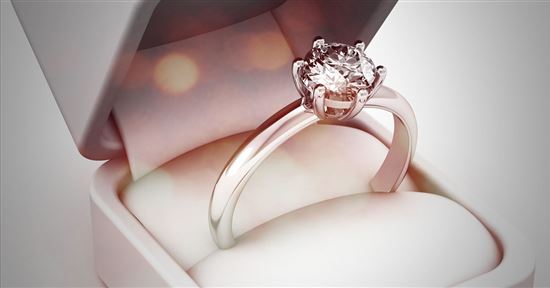 |
Now the bigger question is whether you should propose with a lab created diamond. Should there be a difference? In reality, your relationship shouldn't be based on the size of your diamond or its origin. But that's how our society runs, unfortunately. So how do you know if it's OK?
In a CreditDonkey survey, about 47% of women don't care if the diamond is natural or man-made.
Talk with your loved one. Ask her thoughts on the topic. Many women have an idea of what they want already.
Here are some reasons why some women are against lab-grown diamonds:
- They want the real thing. They don't want a man-made one passed off as real. This mostly stems from not fully understanding what lab diamonds are.
- Diamonds are special because they're rare (or so we think). They're not special anymore if a lab can just mass-produce them in weeks.
- There's less resale value in man-made diamonds. The resale value of diamonds is weak in general. But synthetic diamonds are even worse because they can just be made in large quantities. So there's no historical value or rareness value.
But there are just as many pros for considering a lab created diamond:
- No social and ethical dilemmas. Many mined diamonds come from conflict areas or pose human rights issues. Synthetic diamonds are made in safe environments with fair wages.
- More environmentally friendly. A single carat of diamond requires 200-250 tons of earth to be mined. According to a report by Diamond Foundry (producer of lab diamonds), making lab diamonds have a much, much smaller environmental footprint.
- You can buy a diamond for a lot less. This also means you can afford a larger and higher quality diamond. Or even a fancy colored diamond.
Some women don't have a preference. They are just happy to be marrying the person they love. Others have had an idea of what they wanted since they were little girls. Knowing what she has her heart set on can help.
How to Shop for a Lab Diamond
Here are some tips on shopping for a lab diamond engagement ring.
1. Set a budget
Come up with a reasonable budget that will not put you into debt. The good news is that you can buy a much larger lab diamond with the same budget. If you have a $3,000 budget, you can afford a 1.5 carat lab diamond (as opposed to just a 0.7 carat natural diamond).
2. Find the right retailer
It's important to find a reputable, trustworthy retailer. Look for a vendor with certified lab diamonds, free return policy, and free resizing and warranty. In the next section, we have some recommendations of our favorite lab diamond retailers.
3. Check the lab certification
It's important that the diamond is certified, as that's how you can confirm the quality of the diamond. GIA certified lab diamonds are rare, so IGI (International Gemological Institute) is probably the most reliable lab certification for lab diamonds.
4. Decide on the ring style
The engagement ring should match her personality and fashion sense. The ring design includes:
- Diamond shape: Would she prefer a traditional round, or something more bold, like oval or pear diamond?
- Ring style: From simple solitaire to flashy halo to vintage inspired rings, there are tons of styles for different tastes.
- Metal color: Choose between classy silver-toned metals (platinum or white gold), warm yellow gold, or romantic rose gold.
5. Choose an excellent cut
Just like with natural diamonds, the cut of the diamond is the most important factor. Cut determines how sparkly the diamond will be. Choose an Ideal (or Excellent) cut for maximum brilliance.
6. Color and clarity
For natural diamonds, we always recommend H color and VS2 clarity as the sweet spot for best value. This is still true for lab diamonds, but the difference in pricing is not as significant between grades. So you can get a slightly higher quality diamond if you wish.
Where to Buy Lab Diamonds
Here are some of our top recommended retailers for lab diamonds:
- James Allen: James Allen is one of the most popular online jewelers for its competitive pricing. Check out its selection of lab diamonds.
- Clean Origin: Clean Origin only sells lab created diamonds. Among the retailers we looked into, Clean Origin offers the best pricing.
- Brilliant Earth (read review): Brilliant Earth is known as the ethical diamond retailer. Along with their beyond-conflict-free diamonds, they also have a large selection of lab diamonds. Brilliant Earth does have lab diamonds certified by GIA if you're looking for that.
- Ritani: Ritani stands out for its exceptional online shopping experience. You can get your ring sent to a local partner jeweler to see it in person before taking it home. See Ritani's selection of lab diamonds.
What Experts Say
CreditDonkey assembled a panel of both jewelry and cybersecurity industry experts to answer readers' most pressing questions:
- Are lab created diamonds worth buying?
- What is the safest way to buy online?
- Who should get a lab created diamond?
Here's what they said:
How Synthetic Diamonds Are Made
Synthetic diamonds are created one of two ways:
- High Pressure/High Temperature (HPHT): This method imitates the natural environment where diamonds are created. Small diamond seeds are placed into a press that generates very high pressure and high temperature (over 2000°C). This grows the seeds into larger diamonds, like a sped-up version of what happens beneath the Earth's surface. HPHT is an old method that started in the 1950s.
The HPHT treatment is also used to enhance the color of poor quality natural diamonds. An ugly brown diamond can go through the process and come out colorless. While this sounds good, be careful of HPHT-treated diamonds. If a diamond has been enhanced, labs generally disclose it in their report.
- Chemical Vapor Deposition (CVD): In this method, a small diamond "seed" is placed into a sealed chamber, which is filled with a carbon-rich gas mixture and heated to 800°C-1200°C. The carbon is activated and attaches to the diamond seed, atom by atom until they grow into diamonds large enough for cutting.
While the method sounds complicated, there's no question about the quality of CVD diamonds. John Angus, Emeritus Professor of Engineering at Case Western Reserve University says, "The diamonds made by CVD are exactly the same thing as the ones dug out of the ground, and often are of higher quality. They are definitely not unnatural."
You can read more in depth about these 2 methods and the differences from GIA.
Lab Diamond FAQs
Do lab diamonds look different from natural diamonds?
Since lab diamonds have the same properties as earth-mined diamonds, there is no visual difference between the two.
Even expert gemologists cannot tell them apart just by looking. They would need advanced equipment to distinguish between natural and lab diamonds.
Are lab diamonds fake?
Lab diamonds are very much real diamonds. They are not diamond simulants (such as cubic zirconia and moissanite). Even though those look like diamonds, they don't have the same properties.
Do lab diamonds sparkle?
Lab diamonds have the same refractive index as natural diamonds. They reflect light in the same way, so they have just as much brilliance, fire, and scintillation as natural diamonds.
Do lab diamonds last?
Lab created diamonds have the same hardness as natural diamonds. Both are 10 on the Mohs hardness scale, which is the hardest gemstone available.[1] With proper care, your lab diamond will last forever.
Do lab diamonds get cloudy?
Since lab diamonds are 10 on the hardness scale, they will not get scratched and cloudy. But of course, like with any jewelry, dirt and oil will make your diamond look cloudy. So it's important to regularly clean it to keep it sparkling.
How much do lab diamonds cost
In general, here is what you can expect to pay for a good value lab diamond:
- 0.5 carat: $500 - $700
- 1 carat: $1,500 - $1,800
- 1.5 carat: $2,600 - $3,200
- 2 carat: $4,500 - $5,500
- 3 carat: $9,000 - $11,000
Note that these prices are from online retailers. Physical retailers usually have higher pricing due to the higher overhead costs.
Do lab diamond hold value?
This is one downside to lab diamonds. Since they are mass produced in labs, the resale value is weak. There is no historical or rareness value. In general, though, diamonds do not have much resale value, but lab diamonds are even worse.
Some diamond retailers have a buyback or trade-up program for real diamonds, but it's usually not applicable to lab diamonds. You shouldn't see lab diamonds as an investment piece.
The Final Word
This is a personal choice. There is no right or wrong decision. We have always been about helping you make the best choices for your budget. If you want to save some money by buying a lab created diamond, there's nothing wrong with it.
Synthetic diamonds are very much real diamonds - just not mined from the Earth. Make sure you and your sweetie understand this and that she's OK with not having "the real thing." It's more a mental block than anything else.
References
- ^ National Park Service. Mohs Hardness Scale, Retrieved 9/17/22
Write to Kim P at feedback@creditdonkey.com. Follow us on Twitter and Facebook for our latest posts.
Note: This website is made possible through financial relationships with some of the products and services mentioned on this site. We may receive compensation if you shop through links in our content. You do not have to use our links, but you help support CreditDonkey if you do.
|
|
|

